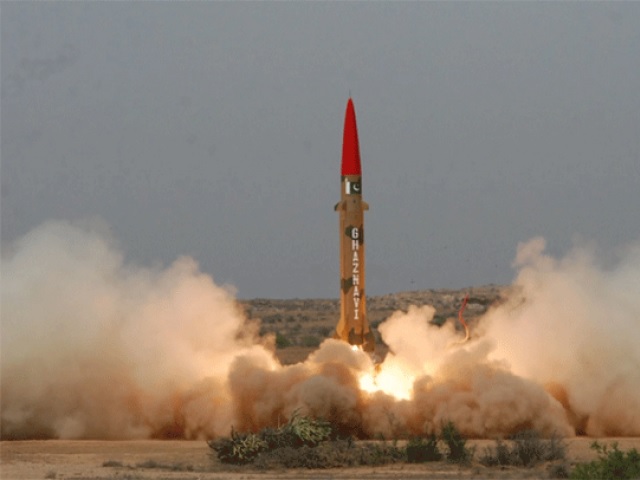By Sameer Ali Khan
American Congressional Research Service released an important report on Pakistan’s nuclear weapons on January 14th, 2016. Besides other aspects, the report narrates Pakistan’s rationale behind acquisition of nuclear weapons, reasons for growth in country’s nuclear arsenal, its principled position on Fissile Material Cut-Off Treaty (FMCT) and why Islamabad has made Nasr – the short range ballistic missile.
The recent literature takes an idealistic approach in assessing the security approaches of smaller nuclear powers, especially Pakistan. The States are expected to abide by certain ‘unsaid’ ideals in the international system which the established nuclear powers learnt by hit and trial; yet those lessons are not necessarily universally applicable. These ideals translate into denying access to latest high-tech military and civilian technologies to such States with no regard to their security dilemmas. Pakistan is a case in point.
Paradoxically, a particular use of nuclear weapons has been justified as a resort to ‘contain’ further loss of human lives but the acquisition of nukes for deterrence and defence has found little acceptance. In spite of the fact that even though India and Pakistan have officially accepted that nuclear weapons are a factor of stability amongst them, some entities continue to consider see nukes as destabilising for the region.
Likewise, Pakistan’s interest to participate in Nuclear Suppliers Group is countered with suggestions that could compromise its options to address its security. Some ‘haves’ in the nuclear non-proliferation regime make such demands blindsided to genuine security concerns without giving any solutions. Islamabad would not don idealism to deal with real threats. The CRS report appears a balanced account compared to the prevalent negative narratives.
The rationale for Pakistan’s development of nuclear deterrent has been duly acknowledged. Once the report discusses that Pakistan is blocking discussions at the Conference on Disarmament; it also attempts to inform the members of Congress about Pakistani concerns i.e. how India-U.S. civil nuclear cooperation agreement, NSG waiver and India’s civil nuclear cooperation agreements with other NSG member states have increased Indian potential for nuclear weapons building. While the report tells the Congresspersons that Pakistan is increasing its nuclear arsenal it also informs them that why Indian reactor grade plutonium stocks may be a source of concern for Pakistan; highlighting the fact that these stockpiles are weapon usable. This is a notion that is generally disregarded by most of the ‘South Asian’ experts despite evidence to the contrary. Most importantly, the report does not blame Pakistan alone for the possibility of instability in the region.
This report also highlights the limitation s that the Congress has i.e. while it may have a say in deciding if Pakistan reaches any civil nuclear cooperation agreement with the U.S., it also informs the members that Congress may not be able to do anything if the U.S. reaches out for Pakistani membership in the NSG.
Unlike the Congressional hearing that ‘discussed’ possibility of civil nuclear cooperation between Pakistan and the U.S. and ended up with informing the Congress that this could be the worst idea; this report though identifies the proliferation activities led by Pakistani individuals, it also acknowledges the efforts that Pakistan has undertaken to ensure that such an act doesn’t recur. It also acknowledges, with references to current and former U.S. officials, that there is no lack of recognition on part of Pakistan to maintain non-proliferation and nuclear security at the highest possible standards.
Luckily, there were not many Congresspersons present in the hearing which dealt with the subject. However, the negative news headlines, following the hearing, would have forced all the members to read through the testimonies presented in the Congress. But it would be a wishful thinking to hope that all of the members would read up the report that has been written primarily for them. Unluckily, the media outlets picked up on issues of their likings to make catchy headlines. Pakistan will continue to face dismissal of its concerns over Indian fissile material stocks and will continue to be told how the Indo-U.S. civil nuclear cooperation has served the non-proliferation regime.
It is important for all the opinion and perception makers to ensure that they do not end up creating a perception that is negative and cannot be undone. Perceptions are poised to stay unless reality takes over. If someone is trusted with the tools to build and shape perceptions; those perceptions better be good. This does not hold true for just the Western writers, it equally or may be at a greater degree applies to our neighbors and us. If we will continue to create alarms about any state, the decision makers will be left with lesser space and decision making options. While the objective of researchers, academics and scholars should be to increase that space and options and help the decision makers find areas of convergences to cooperate on.


